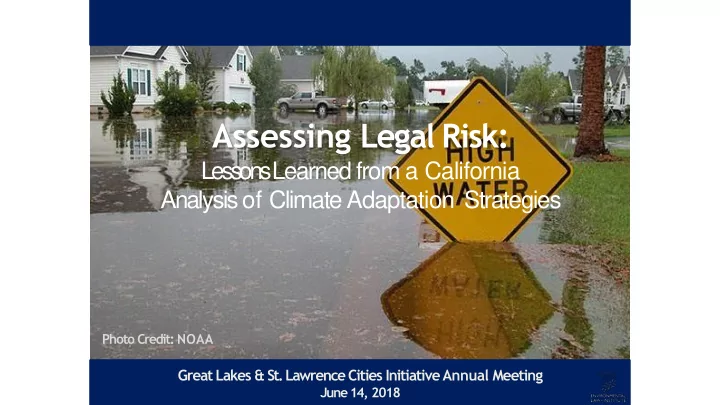

Assessing Legal Risk: Lessons Learned from a California Analysis of Climate Adaptation Strategies Photo Credit: NOAA Great Lakes & St. Lawrence Cities Initiative Annual Meeting June 14, 2018
About E L I www .eli.org
About Our Climate Resilience Work Helping Getting People and Governments Property Out of Create Resilient Harm’s Way Communities Helping Creating Resilient Communities Ecosystems Become Resilient Photo credits (clockwise from top left): Rebecca Kihslinger, ELI; from Pixabay; U.S. Department of Agriculture ; from Pixabay.
Today’s Discussion • Resilient Coastlines of Greater San Diego project • Our Focus and Approach • Lessons Learned Photo from Pixabay
Resilient Coastlines Project www.resilientcoastlines.org
Project Partners www.resilientcoastlines.org/partners
Our Focus
Our Approach Looked at legal risks for: • No action (i.e., do not implement adaptation strategies) o Action (i.e., implement adaptation strategies) o
Our Approach: No Action Local government fails to act, leading to the flooding of private property City’s stormwater drainage system can no longer keep up, leading to the flooding of private property Rising waters submerge land where the government has negotiated easements with private property owners for public access
Analysis Local government fails to act, leading to the flooding of private property Unlikely to give rise to takings, City’s stormwater drainage system but law continues to evolve. can no longer keep up, leading to May be more vulnerable to the flooding of private property other takings claims. Rising waters submerge land Unlikely to give rise to a takings if adaptation measures considered an where the government has negotiated easements with private upgrade (as opposed to maintenance) of the system property owners for public access Easement unlikely to migrate
Our Approach: Action Beach Nourishment Dune Restoration & Enhancement Offshore Protections Hard Armoring (Seawalls or Revetments) Zoning and Land Use
How Defined Risk At least two applicable: difficult CEQA process, Coastal Act provision at is ! High Risk is involved in litigation or uncertain in application, high probability of tak lawsuit and uncertain risk of losing case, other major legal issues At least two applicable: some CEQA hurdles, Coastal ! Moderate Risk Act ambiguous on permitting, moderate probability of takings lawsuit but low probability of losing case, other possible legal issues All applicable: no major CEQA or Coastal Act hurdles ! Low Risk beyond obtaining permits, takings lawsuit unlikely , no major legal uncertainty about application of Coastal Act or takings law , no other clear legal issues
Analysis Beach Nourishment Low-moderate Dune Restoration & Enhancement Low Offshore Protections Low-moderate to High Hard Armoring (Seawalls or Revetments) Moderate to High Zoning and Land Use Low to High
Lessons Learned Not much attention focused on legal aspects of climate • adaptation • Fact-specific, depends on law Likely to see increase in litigation • Not clear how law will evolve • Risk everywhere (good to understand risks, but not be • paralyzed by it)
And…. Aside from potential legal liabilities, many other good reasons • to implement adaptation strategies
Thank you! T eresa H. Chan Senior Attorney | ELI (202) 939-3848 | chan@eli.org
Recommend
More recommend